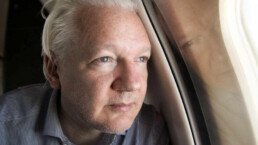After over half a decade of imprisonment and constant government harassment, Julian Assange is free and speaking out for freedom of speech and human rights. His freedom is a relief, but the state of protections for journalists like him is far from strong.
By Chip Gibbons, Jacobin
“I am not free today because the system worked,” Julian Assange told an assembled group of parliamentarians from across Europe earlier this week. “I am free today because after years of incarceration I pled guilty to journalism. I pled guilty to seeking information from a source. I pled guilty to obtaining information from a source. And I pled guilty to informing the public what that information was. I did not plead guilty to anything else.”
These words marked Julian Assange’s first public remarks as a free man, and his first significant public comments in over half a decade. Assange gave his last public interview in 2018. From 2019 until June 2024, he had been held in a maximum-security prison, largely unable to speak directly to the public.
Since agreeing to plead guilty under the Espionage Act to what essentially amounts to journalism, Assange has largely avoided the public eye. He has given no interviews and maintains no social media accounts. His wife, Stella, has explained that Assange, who endured what a United Nations expert labeled “torture,” needed time to recover.

But on October 1, 2024, Assange delivered testimony to the Parliamentary Assembly of the Council of Europe (PACE). The council is a body of forty-six European countries tasked with protecting human rights in Europe. PACE’s members are parliamentarians in their respective countries.
PACE has repeatedly expressed concern about Assange’s detention and the US case against him. It appointed Þórhildur Sunna Ævarsdóttir, an Icelandic parliamentarian from the Pirate Party, to act as its official rapporteur on “the detention of Julian Assange and its chilling effects on human rights.” As part of her work, she asked Assange to testify before a committee on the day before the larger PACE group was to debate a resolution she put forward as part of her mandate. The resolution declared Assange had been a political prisoner during his detention and called on the United States to reform its Espionage Act. It passed 88–13, with 20 abstentions.
Recent Posts
As Security Council Stalls, There Are Other Ways to Stop U.S.-Israeli War on Iran
March 3, 2026
Take Action Now A “Uniting for Peace” resolution in the UN General Assembly can counter the Security Council’s failure to act.By Marjorie Cohn,…
States Can Block the Paramount-Warner Deal
March 3, 2026
Take Action Now But thanks to some clever maneuvering, they are already running out of time.By David Dayen, The American Prospect What started as…
Congress, Do Your Job and End This Illegal War of Aggression By The U.S. and Israel
March 2, 2026
Take Action Now Congress must assert its Constitutional authority over matters of war and peace against an out-of-control, rogue president and…
Daniel Ellsberg Speaks to Us as the War on Iran Continues
March 2, 2026
Take Action Now Ellsberg’s voice is back via a compelling new book. “Truth and Consequence,” being published this week, provides readers with his…




